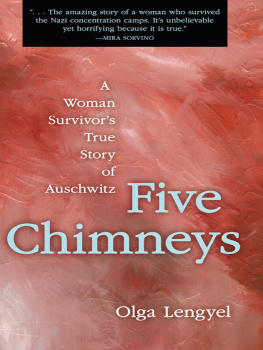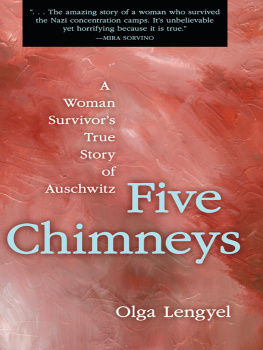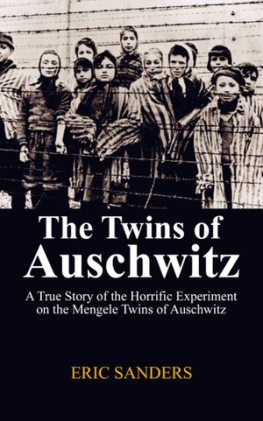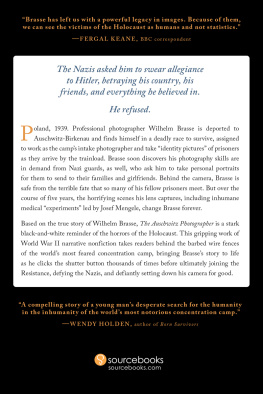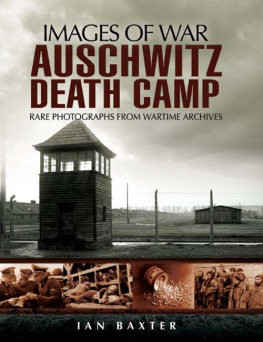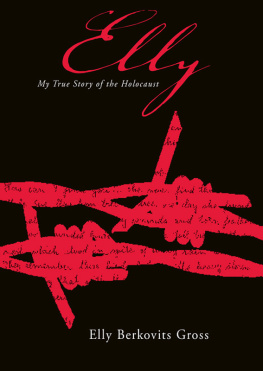FIVE CHIMNEYS
Olga Lengyel
FIVE CHIMNEYS

Academy Chicago Publishers
Academy Chicago Publishers
363 West Erie Street
Chicago, Illinois 60654
Ziff-Davis Publishing Co., 1947
All rights reserved.
First Academy Chicago edition 1995
Printed and bound in the USA
eBook ISBN: 978-0-89733-631-4
14 13 12 11 11 10 9 8
No part of this book may be reproduced in any form
without the express written permission of the publisher.
Dedicated to the memory of my
parents and husband,
my godfather and my children and to my
fellow inmates of Hitlers concentration
camps in World War Two
who, silenced for ever, are mostly forgotten.
1959
Contents
From a letter to Olga Lengyel
from Albert Einstein
Thank you for your very frank, very well written book. You have done a real service by letting the ones who are now silent and most forgotten speak With best regards and wishes,
A. Einstein.
C HAPTER I
8 Horsesor 96 Men, Women, and Children
Mea culpa, my fault, mea maxima culpa! I cannot acquit myself of the charge that I am, in part, responsible for the destruction of my own parents and of my two young sons. The world understands that I could not have known, but in my heart the terrible feeling persists that I could have, I might have, saved them.
It was 1944, nearly five years after Hitler had invaded Poland. The Gestapo ruled everywhere, and Germany fattened on the loot of the Continent, for two-thirds of Europe lay under the talons of the Third Reich. We lived in Cluj, a city of 100,000, the capital of Transylvania. Formerly it had belonged to Rumania, but the Vienna Award of 1940 had transferred it to Hungary, also one of the New Orders satellite countries. The Germans were the masters, and though one hardly dared to hope, we sensednay, we prayedthat the day of reckoning was not far off. Meanwhile, we tried to stifle our fears and go about our daily tasks, avoiding, whenever possible, any contact with them. We knew that we were at the mercy of ruthless menand women, too, as we later learnedbut no one could have convinced us then how truly pitiless they could be.
My husband, Miklos Lengyel, was the director of his own hospital, Doctor Lengyels Sanatorium, a modern two-story seventy-bed institution, which we had built in 1937. He had studied in Berlin, where he had devoted a great deal of time to charity clinics. Now he specialized in general surgery and gynecology. Extremely skillful, and devoted to his science, he was widely respected. He was not a political man, although he understood fully that we were in the center of a maelstrom and in constant peril. He had no leisure for outside occupations. Frequently he had to see 120 patients in a single day and was in surgery till the wee hours of the night. But Cluj was a thriving community, and we were proud to operate one of its chief hospitals.
I, too, was devoted to medicine. I had attended the University in Cluj and had qualified to be my husbands first surgical assistant. Indeed, I had helped to finish the new hospital, bringing to its decor a womans love for color, and so had brightened the appointments in the most modern fashion. Yet, although I had a career, I was even prouder of my little family, for we had two sons, Thomas and Arvad. No one, I thought, could be happier than we were. My parents lived with us and so did my godfather, Professor Elfer Aladar, a famous internist who was doing cancer research.
The first years of the war had been relatively calm for us, though we listened with dread to the never-ending accounts of the Reichswehrs triumphs. As the Germans ravaged more and more territories, doctors and especially capable surgeons to serve the civilian populace became fewer. My husband, though prudent and sufficiently circumspect, made little effort to conceal his hope that the cause of humanity might not be entirely engulfed. Naturally, he spoke freely only to his confidants, but corruptible souls lurked in every circle and one never knew who might next turn informer. However, the authorities in Cluj left him in peace.
As early as the winter of 1939 we caught an inkling of what was going on inside the lands which the Nazis had occupied. At that time we gave sanctuary to a number of Polish refugees who had fled their homes after their armies were surrounded. We listened, we sympathized, and we helped. Nevertheless, we could not fully credit everything that we heard. These people were overwrought and distracted; they might be exaggerating.
As late as 1943, frightening accounts reached us of atrocities committed inside the concentration camps in Germany. But, like so many of those who read this today, we could not believe such horrible stories. We still looked upon Germany as a nation which had given much culture to the world. If these tales were at all true, the shameful acts must be due to a handful of madmen; this could not be national policy, nor part of a plan for global mastery. How little we understood!
Even when a German major in the Wehrmacht, who was billeted in our home, spoke of the fog of terror with which his country had blanketed Europe, we could not accept it. He was not an uneducated man; I was therefore convinced that he was trying to frighten us. We tried to live apart from him, until one evening he demanded to join us. It seemed that he only wanted to talk, but the longer he spoke the more bitterness he spewed out. Everywhere, he declared, the subject peoples gazed at him with eyes that brimmed with hatred. Yet from his family at home he received only complaints that he was not sending back enough loot! Other soldiers, privates and officers, were sending home so much more in jewelry, clothes, art objects, and food.
I had to listen. What impressed me was his violent self-hatred as he told of marching his troops down roads that were literally flanked by bodies swinging from gallows. I vowed that he was either mad or drunk, though I knew that he was neither. He told us about motor vans, constructed expressly to gas prisoners. He spoke of huge camps devoted solely to the extermination of civilian minorities by the millions. My flesh crawled. How could anyone believe such fantastic tales?
We did have a few alarming experiences in Cluj, and, as I reflect now, I am sure that any one of these should have been a warning. The most serious occurred in early 1944. One day my husband was called to the police station for interrogation by the feared S.S. He was accused specifically of boycotting the use of German pharmaceutical preparations in his clinic.
Representatives of the German Bayer Company, many of whom were secretly members of the S.S., moved freely through Transylvania, to their personal profit, and to further the expansion of their firm. They had built a network of espionage, and a man who owned a large hospital, and was probably no friend of the Third Reich, was an easy target.
Fortunately, Dr Lengyel was able to supply a plausible explanation, and the S.S. released him. Privately, we agreed that the questioning must have been prompted by a denunciation. We were even certain that we knew the envious colleague who was responsible.
That episode should have prepared us for what followed. However, we could not imagine how cunningly the German masters laid their plans. They baited many traps, but they wanted a big haul for their trouble.
The first week in May, Dr Lengyel was summoned to the police station again. I became apprehensive the moment he left the clinic. When he did not return soon I made inquiries. Almost as though in a dream I received the news that he was to be deported to Germany immediately.
Frantically, I sought more information. All that I could learn was that he was to be sent away by train within an hour.
Next page
